Adjustments in university training
Faced with major changes in the labor market, universities are constantly adjusting their training programs to meet practical needs. In 2025, many universities will open new training majors, especially interdisciplinary fields, combining technology with economics and management.
The Academy of Policy and Development plans to expand its training scale with 11 majors and 26 programs, including adding 5 new majors to help students adapt to the digital economy.
According to Dr. Nguyen Thi Dong, Head of the Academy's Training Management Department, the 2025 enrollment season will mark many important changes in the training development strategy. A number of new programs such as Digital Marketing, Global Business... will be implemented, integrating economics, management and technology. These majors not only equip students with professional knowledge but also help them develop skills to adapt to the modern labor market, where digital technology plays a key role. These are interdisciplinary programs, combining economics, business and technology to meet the requirements of human resources for national development in the digital age.
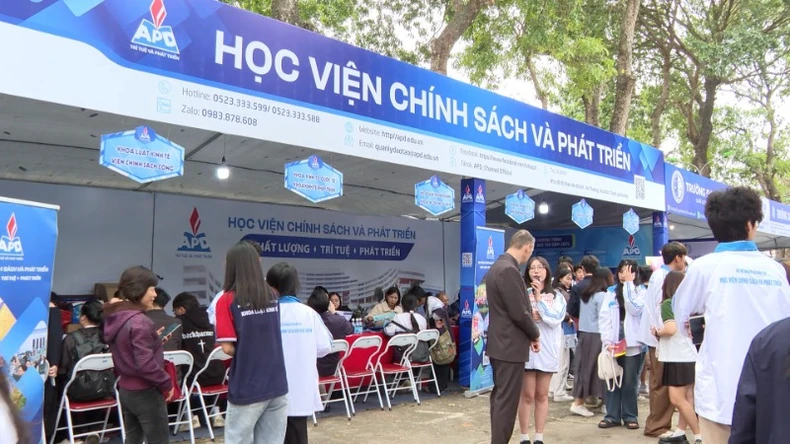 |
| The Academy of Policy and Development offers many training programs combining technology and economics. |
Similarly, the University of Commerce has also developed 7 more international professional training programs, including Brand Management, International Certified Integrated Auditing, Economics and Investment Management... These programs are 100% taught in English and integrate AI-related content. These new programs aim to equip students with both professional skills and foreign language ability upon graduation, to participate in the international labor market. In addition, the school plans to have two more international dual degree programs in Marketing and Business Administration, and an advanced technology transfer program.
Mr. Nguyen Quang Trung, Deputy Head of the Department of Communications and Admissions, University of Commerce said: "The international advanced and dual degree programs are 100% taught in English with a team of lecturers with professional qualifications that meet the standards of international lecturers. In particular, these programs all integrate subjects related to AI technology."
 |
Phenikaa University integrates online courses into its training programs to help students update their knowledge of new technology. |
Professor, Dr. Nguyen Van Hieu, Vice Principal of Phenikaa University, said that the rapid development of technology, especially AI and data science , is posing an urgent need for training students in self-learning skills. Training programs cannot continuously keep up with changes in technology, so equipping students with the ability to adapt is a key factor.
Phenikaa University has developed majors and interdisciplinary majors such as digital technology, digital economics, digital business, digital logistics... to increase job opportunities for students.
According to Professor Hieu, if you continue to study traditional majors, your career opportunities will be significantly narrowed. For example, traditional marketing is gradually being replaced by digital marketing.
In addition, the school also integrates online courses into the training program, helping students update technology, especially AI.
“In just the next 5 years, AI could become a recruitment standard, like foreign language certificates today,” Professor Hieu emphasized.
This year, the Vietnam-Germany University launched two new majors: Mechatronic Engineering and Economics, and offered full scholarships to students. According to Dr. Ha Thuc Vien, Vice Principal of the school, the Mechatronic Engineering major was established to meet the trend of converting vehicles to use clean energy such as electricity and hydrogen. Meanwhile, Economics still plays an important role in economic management and development. The school aims to train according to the standards of the Federal Republic of Germany, giving priority to candidates with good foreign language skills.
The AI wave is also creating major changes in the field of journalism and media, from supporting data analysis, content creation to the emergence of “robot journalists”. However, along with the opportunities come challenges of fake news and information accuracy.
To help students adapt, the University of Social Sciences and Humanities has added AI skills, virtual reality and a digital competency framework to its training program. Meanwhile, the Academy of Journalism and Communication has flexibly expanded its programs, expanded interdisciplinary credits, and encouraged dual majors to increase employment opportunities.
According to Associate Professor, Dr. Nguyen Thi Truong Giang, journalism students can work in many fields, from electronic newspapers to digital media, improving their competitiveness in the digital age.
Important criteria when choosing a career
The fact that many agencies in the public administration are merging, consolidating, and streamlining their apparatus according to Resolution 18-NQ/TW has made many 12th graders very worried about choosing a major and choosing a school. Loving the job related to content creation, Nguyen Minh Ngoc, a 12th grader at Viet Duc High School (Hanoi) plans to choose journalism and multimedia communications. However, in the context of press agencies merging and streamlining their apparatus, Ngoc expressed her concern that it will be difficult to find the desired job after graduation.
Deputy Minister of Education and Training Nguyen Minh Son. |
Deputy Minister of Education and Training Nguyen Minh Son said that choosing a major is not simply following trends. Learners need to consider their own abilities as well as the long-term needs of the labor market. Sustainable majors are often those that provide solid foundational knowledge, helping students adapt to many different fields. The philosophy of university training is that students must have core knowledge and abilities to be able to learn for life, and only when they have the ability to learn for life will people be irreplaceable.
Teacher Ta Van Hoai Thanh, career consultant of Empire Team Education System, recommends that young people need to combine personal interests with the development context of the job market. Professions that combine economics and technology such as data science, information systems management, e-commerce or digital marketing are in high demand. International training and cooperation programs also need to be carefully considered. Priority should be given to schools with curricula updated according to global trends, cooperating with reputable organizations and businesses and creating conditions for students to participate in international exchange programs. Finally, consulting with students and alumni will help candidates have a more realistic view of training quality as well as career opportunities after graduation.
Need to adapt to not be left behind
In the context of strong development of AI and digital transformation, choosing a career requires careful consideration. Instead of choosing a career based on interest, young people need to focus on interdisciplinary fields that are in line with technological trends. Moreover, equipping themselves with self-learning skills and constantly updating their knowledge will help them maintain a competitive advantage in an increasingly demanding labor market.
In addition, the admission trend is also changing with the expansion of admission combinations, increasing the chances of admission for candidates. Universities are gradually changing their training methods, providing many options for students to study two majors or participate in international programs. This brings great opportunities but also places higher demands on foreign language skills, adaptability and autonomy of students.
The changing times wait for no one. Only those who know how to adapt and proactively equip themselves with knowledge can stand firm and succeed in the AI era.



![[Photo] Prime Minister Pham Minh Chinh attends the annual Vietnam Business Forum](https://vphoto.vietnam.vn/thumb/1200x675/vietnam/resource/IMAGE/2025/11/10/1762780307172_dsc-1710-jpg.webp)


![[Photo] Prime Minister Pham Minh Chinh attends the Patriotic Emulation Congress of the Ministry of Foreign Affairs for the 2025-2030 period](https://vphoto.vietnam.vn/thumb/1200x675/vietnam/resource/IMAGE/2025/11/10/1762762603245_dsc-1428-jpg.webp)







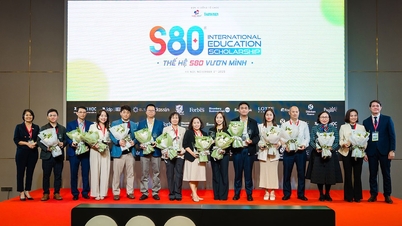


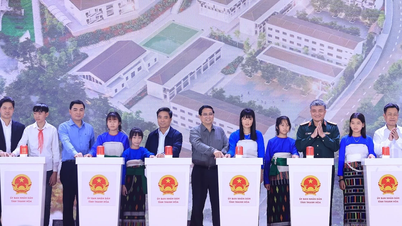





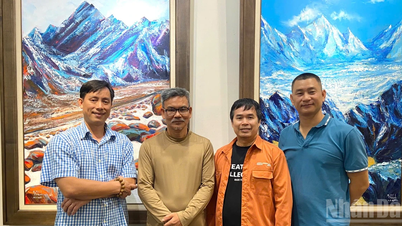

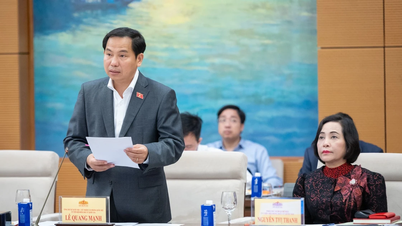


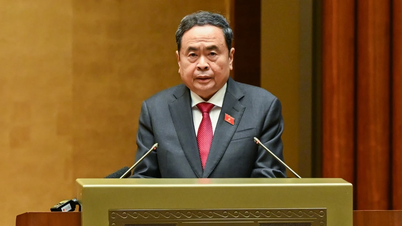





































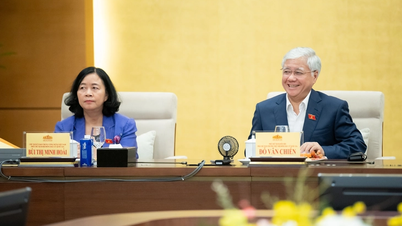




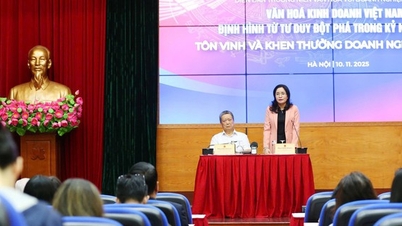












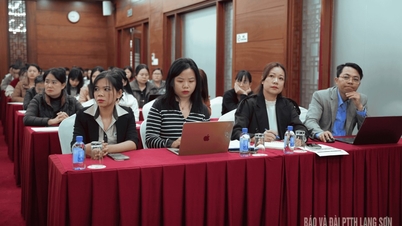




![Dong Nai OCOP transition: [Article 3] Linking tourism with OCOP product consumption](https://vphoto.vietnam.vn/thumb/402x226/vietnam/resource/IMAGE/2025/11/10/1762739199309_1324-2740-7_n-162543_981.jpeg)









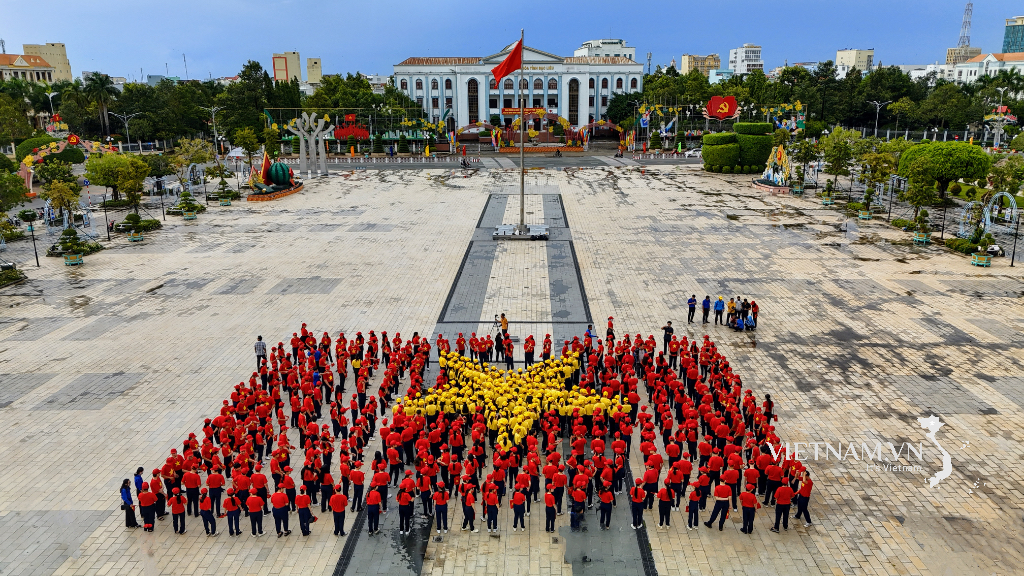

Comment (0)